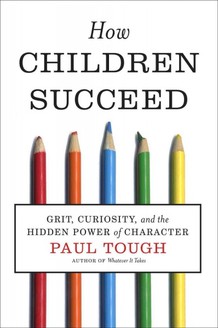So much of what Paul Tough discusses in How Children Succeed: Grit, Curiosity, and the Hidden Power of Character bear on aspects in moral theology. Tough is reporting on a line of research that so many others have explored, including Angela Duckworth, one of the current MacArthur Foundations fellows.
His basic thesis is simple: What enables kids to succeed in school (and by implication society) is not so much IQ but rather grit. Tough defines grit in several ways. It is delayed gratification, being able to forgo short-term rewards for long-term gains. It is tenacity, the ability to persist in the face of failure. It requires “consciousnesses” which Tough defines as continually completing mundane or routine tasks without immediate or obvious reward. This grit enables kids to study for a test, complete work on time, do what is assigned even if the goal or objective is unclear. It enables students to confront their mistakes and learn from them.
Tough argues that learning grit can be difficult in our society. It requires both real adversity and real safety. Children in poverty struggle to learn grit because they so often lack a safe space. Their schools or neighborhoods are violent, money is scarce, or mental health or addiction issues afflict the family. Whatever the scenario, it means that children are buffeted by adversity. Children frequently resign themselves to the situation, giving up any sense of control and any hope of change. Even if they do strive to overcome these challenges, there is no room for error. One mistake, one moment of not delaying gratification or one lack of consciousnesses, can be catastrophic. There is no parent or teacher or money to bail them out. Without safety, children are overwhelmed by the adversity and cannot learn grit.
Children who are rich struggle to learn grit because they so often lack adversity. They have so many resources that they rarely face any threat of failure, much less actual failure. Everything comes easy, and they learn that failure is something to be avoided at all costs. The result, though, is that this safe course produces either an inability to take on real challenges or a meltdown when failure does occur. Without adversity, children are too secure and cannot learn grit.
Tough’s work is of particular interest to theologians for two reasons. First, it helps to understand our work as teachers. In his seminal research, George Hillocks indicated that comments on papers only help if they are accompanied with a chance for revision. Without this opportunity, students do not learn from their mistakes, improve in their writing, or refine their ideas. As most of us know, it takes time to develop and communicate an idea, time to work with it, wrestle with it, clarify exactly what you want to say. This is an example of grit. Thus, as we think about our classroom we need to account for this factor. We need to find some way of fostering this grit in students so they can better develop their own ideas and their own communication of these ideas.
Second, Tough’s definition of grit also bears one of the key questions of moral theologian today: how do we, in our particular context, become better disciples? In the United States, there are challenges from a consumerist culture, by political power, and because of corruptions in our own church, so moral theologians attempt to diagnosis these challenges as well as provide guidance on how we might faithful love God with all our heart, mind, soul, and strength and love our neighbor as ourselves. Grit, it seems to me, is one of these key components. We need grit to be able to confront sin—personal, social, and original sin—and keep going. We need grit, but we also do not develop it by ourselves. We need a community that is safe enough for us to develop trust and confidence in our decisions and actions. We also need a community that fosters vulnerability, one not closed off to adversity, not closed off to others. We need the Church to help us become disciples who perpetually pickup our crosses and follow Christ.
This is the part of a periodic series—You Should Read This—on works worth reading. Use the search phrase “you should read this” to see the others.



